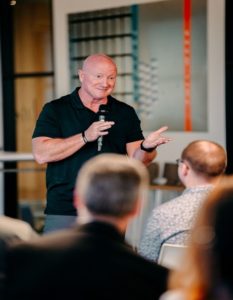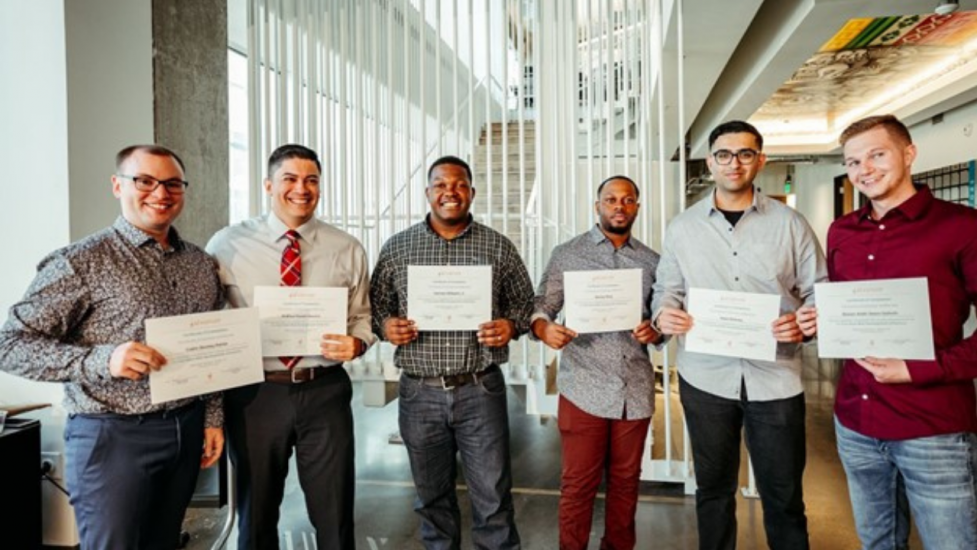For many service members, exiting the military to enter the civilian workforce can be stressful and even difficult as they leave a stable career behind. The workforce they are entering is likely very different than they one they knew before entering the service.
One boot camp program called Operation LevelUp aims to make that transition successful by using the final phase of active duty to teach soldiers the skills they need to enter the in-demand field of software engineering.
“We’re not only teaching them these technical skills, we are teaching them how to learn, how to solve problems, and we’re helping them along the way,” says Matt Elledge, a former U.S. Army Colonel who is director of military affairs at tech ed company Galvanize, which runs the boot camp.
The company embeds itself on bases including Fort Hood and four others to offer an 18-week immersive program to active-duty personnel about to exit the service. Elledge says software engineering skills were chosen because of the high demand from all kinds of industries.
Openings for software and application developers top the list of hiring activity among tech positions, according CompTIA, a trade group tracking tech employment in the U.S.
“They are needed everywhere and that’s why there are so many job openings in this field. “I don’t see software engineering ever going away,” says Elledge. And the majority of the jobs don’t require four-year degrees.
These jobs are projected to grow 8% between 2019 and 2029, according to the Bureau of Labor Statistics, with a median salary of $77,000.
Increased Demand for Software Engineering Skills
“In the last few years, there has been a correlated increase in demand for software engineers,” says Dave Walters, CTO at Hired, an AI-driven marketplace matching tech talent to companies.
Software engineering can include different roles depending on skill level and job functions. Web developers that focus only on web applications, explains Walters, is one specific role falling under the broader software engineering category. He says web developers are in high demand especially for candidates skilled in the coding languages of Python, Java and JavaScript.
Software engineers not only build software for web applications but also for desktop and mobile applications, explains Walters, lists Redux.js, Google Cloud, AWS, and React.js as the highest in-demand coding skills. For coding languages, he says Go and Scala top the list.
As for education levels required for these jobs, a traditional university degree is not always needed. Hired finds that while 45% of software engineers have a computer science degree, and 22% have a relevant college degree, another 23% are self-taught, and 10% went to a boot camp program. While the cost of coding boot camps can vary, the average cost is estimated at $13,584.
Operation LevelUp
28-year-old Army veteran Zach Yusef learned his software engineering skills during his final months of active duty at Fort Hood, Texas through Operation LevelUp.
His tuition was paid through the U.S. Veterans Affairs program and one year after leaving the military, Yusef says, his salary has roughly tripled from his military paycheck.
“It was honestly life changing for me,” says Yusef. He calls it a “no brainer” for him to decide to learn skills for a career in software engineering. “Careers in tech are offering the highest starting salary for people who did not have any experience and it was fun,” he adds.
Yusef also describes the coursework at Operation LevelUp as intense. Days are typically 10 hours long and he describes daily coding challenges, individual work, and team work.

Galvanize’s Elledge says coursework starts with providing programming fundamentals in web development. It then delves into software engineering and works up to a final project with everyone working as a team much like they would do in the workforce.
“We invite people to come in, act as customers and these young software engineers get an opportunity to define the problem and then help come to a solution for the customer,” explains Elledge.
“They know the languages that are predominantly used in the industry from customer interface all the way back to the servers,” he explains. The way he sees it, the military and tech are a good fit because “the military is all about solving problems.”
As a veteran, there’s another piece of the program that is important to Elledge. “I really wanted to make sure we had a career services team or a talent management team that would grab these students and graduates up and help them and prepare them for life outside of the military and help them find a position,” says Elledge.
For students like Yusef, that kind of support made a difference. The former U.S. Army sergeant worked as a petroleum and logistics manager at Fort Hood for three years.
Before entering the military, he earned a college degree in mechanical engineering but could not find a job in the oil industry.
It was that job hunting experience, Yusef says, that prompted him to learn coding skills before he transitioned out of the army. “It was very, very scary for me to leave a stable job in the military and take that chance going into a whole different field after what I had gone through,” adds Yusef.
He says working with a career counselor taught him to be proactive as he began looking for a job in March of 2020, just as the country was closing down because of the pandemic. It took him roughly three months to land the job that he currently holds.
He credits skills he practiced in the military such as working with all kinds of people, learning to be prepared and being resilient with helping him in his new career.
Yusef urges service members to take charge of their transition early in the process and research skills needed for potential careers. He adds “If I hadn’t done that in time, I don’t know how things would have turned out.”











